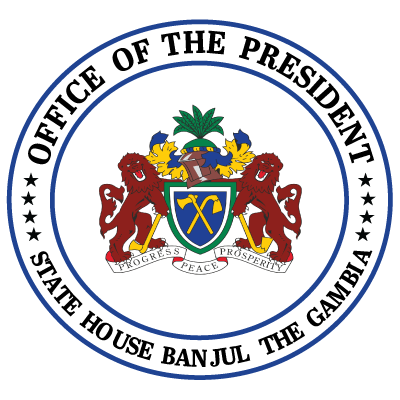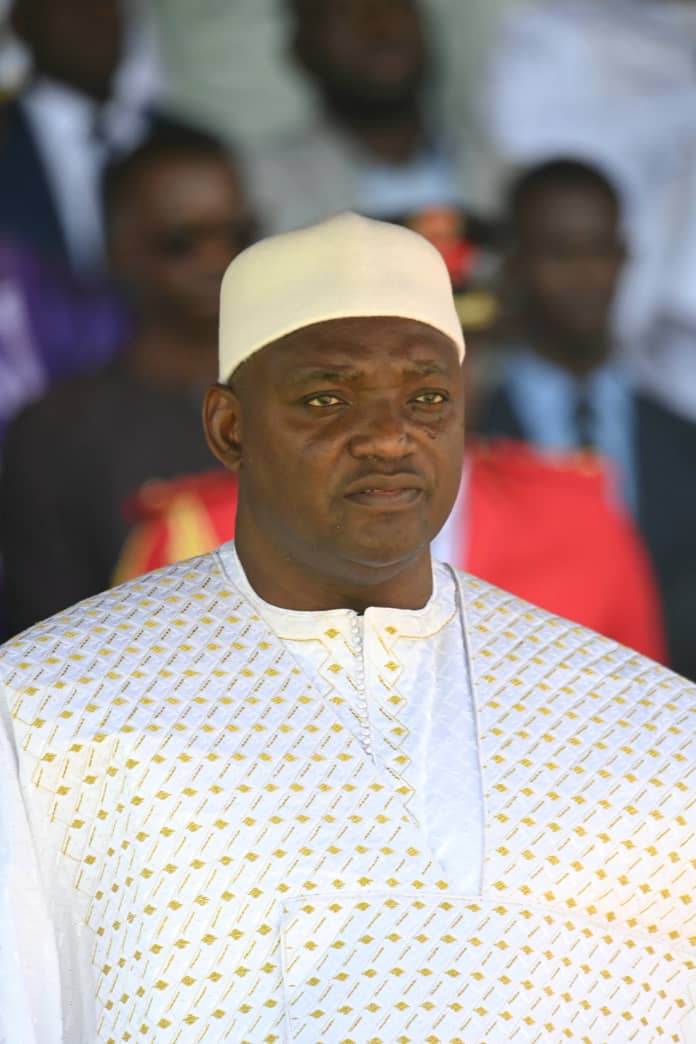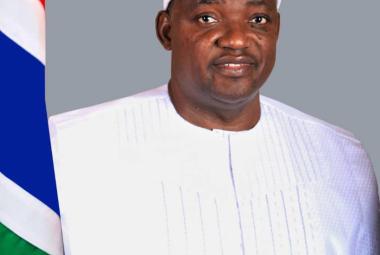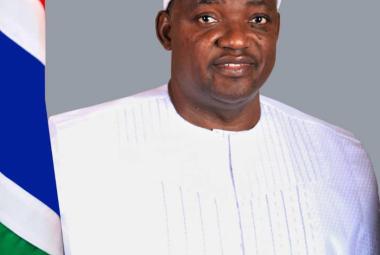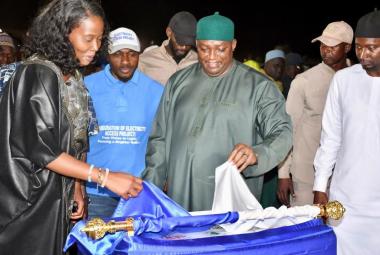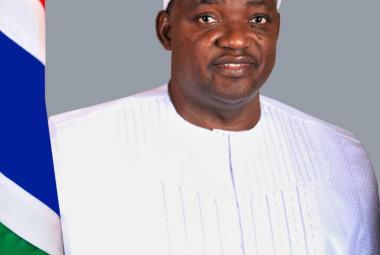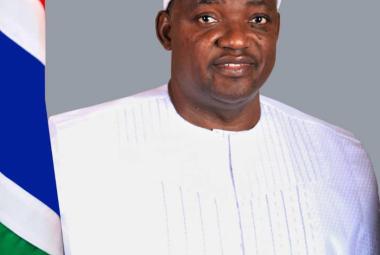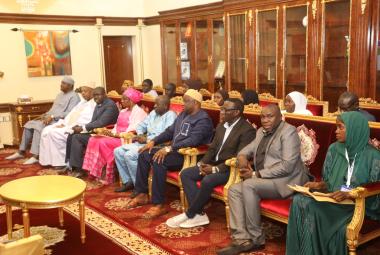As The Gambia jubilantly celebrates its 60th year of independence, fate has orchestrated an extraordinary parallel—His Excellency President Adama Barrow, the man at the helm of the nation’s transformation, also turns 60. This cosmic alignment is no mere coincidence; it is an indication to his special place in Gambian history. Born on February 15, 1965—just three days before The Gambia severed its colonial chains—President Barrow’s life has been an uncanny reflection of the nation’s own journey: a tale of humble beginnings, trials by fire, and a steady march towards a brighter future.
Hailing from the quiet village of Mankamang Kunda in the Upper River Region, President Barrow’s ascent to power was anything but conventional. He did not claw his way through the political trenches in pursuit of self-serving ambition. No, his leadership emerged from an urgent national cry for change—a call that echoed through the land after 22 years of oppressive rule. The Gambia had endured a suffocating dictatorship that seemed impervious to even the sharpest political minds, the most seasoned legal experts, and the most resolute activists. Time and again, attempts to unseat the tyranny ended in failure. Yet, when the odds seemed insurmountable, destiny anointed an unlikely hero. From the periphery of political power, Adama Barrow stepped forward—not as a career politician, but as a man of the people, divinely placed to lead his country into a new era of democracy and hope. His rise was nothing short of providential—a reminder that sometimes, history does not choose the loudest or the most visible, but the most prepared.
His formative years mirrored the quintessential Gambian experience. Like many rural children, he journeyed to Banjul, the nation’s capital, to further his education. But Banjul was more than just a classroom; it was a test of national identity, a vibrant confluence of cultures, politics, and traditions. It was here, amidst the bustling streets, the chatter of traders, and the corridors of learning, that Barrow absorbed the essence of his nation.
He did not merely pass through the city; he became part of its heartbeat. He immersed himself in its linguistic and cultural diversity, mastering English, Wolof, and Sarahuleh in addition to Mandinka and Fula, weaving himself into the fabric of a society that spanned every ethnic and social divide. He did not see Gambians as factions to be managed, but as a single people with a shared destiny. His ability to connect with citizens from all walks of life—speaking their languages, understanding their struggles, and embracing their dreams—became his greatest political weapon.
As The Gambia celebrates six decades of independence, it does so under the leadership of this man whose own life is a testament of the nation’s resilience, ambition, and boundless potential. Adama Barrow is not merely a president—he is a living embodiment of The Gambia’s extraordinary journey, an evidence that true leadership is not seized, but bestowed upon those who dare to dream beyond themselves.
His journey from humble beginnings to the pinnacle of leadership is a tale woven with ambition, resilience, and an unyielding love for his homeland. As a young man, he found himself under the wing of a formidable Sarahuleh business tycoon, absorbing the intricate art of commerce with the diligence of a devoted apprentice. Under this tutelage, he cultivated sharp entrepreneurial instincts, an ironclad discipline, and a business sharpness, that would later define his success. Yet, like many restless dreamers of his generation, the siren calls of the Western world proved irresistible.
With a heart full of hope and eyes set on broader horizons, he ventured first to Germany, then later to England, immersing himself in the grind of hard work and perseverance. He toiled with determination, carving out a life in a foreign land, yet something deep within him remained unsettled. No matter how far he roamed, the pulse of The Gambia throbbed in his veins. The rhythm of its soil, the call of its destiny—these forces were relentless. And so, with the conviction of a man answering fate’s summons, he returned home, not merely as an entrepreneur, but as a man destined to leave his mark on history.
Adama Barrow’s story is not one of mere survival, but of audacity, defiance, and an unbreakable patriotic spirit. When friends and family urged him to reconsider—when fear whispered cautionary tales of a homeland shackled by tyranny—he did not yield. The Gambia of his return was a nation bound in the iron grip of dictatorship, a place where ambition was suffocated, and the price of defiance was torment. Yet, in a land where silence was the safest currency, he chose to speak through action. He built an honest and thriving real estate business, a beacon of integrity in a sea of coercion. His enterprise was more than personal success—it became a lifeline for countless Gambians, offering employment, dignity, and the rare proof that ethical business could flourish even in the shadows of repression.
But his ambitions stretched beyond commerce. While many businessmen and women found solace in aligning with the ruling regime—playing it safe, avoiding the wrath of power—he charted a different course. He joined the United Democratic Party (UDP), an opposition movement that had, since its inception in 1996, been a thorn in the dictator’s side, enduring endless persecution. His sincerity, his transparency, and his unshakable belief in justice earned him the role of party treasurer—a position he embraced not for personal gain, but for the greater cause of democracy.
Then came 2016, a year that would be chiseled into the annals of Gambian history as the moment when courage triumphed over fear. The UDP leadership was imprisoned in a brutal crackdown, and the country teetered on the cliff of despair. Yet, amid the uncertainty, the fractured opposition found unity, and from this coalition of seven parties, a leader was sought. Many recoiled from the challenge, unwilling to risk everything against a tyrant who had held power for 22 years with an iron fist. But fate had already chosen its champion. Adama Barrow, armed with little more than an unyielding spirit and the hopes of a nation on his shoulders, stepped forward.
Against all odds, against the machinery of an entrenched autocracy, he emerged victorious. It was more than an election win—it was a rebirth. The Gambia, long suffocated under dictatorship, inhaled the fresh air of democracy. Barrow did not merely take office; he ushered in an era of transformation. He flung open the gates of the prisons, setting political detainees free. He welcomed exiles back home, men and women who had been driven away for daring to dream of a freer Gambia. He restored the fundamental freedoms that had been stolen—the right to speak, to associate, to dissent without the looming specter of persecution.
No longer would journalists be jailed for telling the truth. No longer would activists vanish into the abyss of oppression. No longer would Gambians live in fear of their own voices. President Barrow did not just defeat a dictatorship; he reignited the spirit of a nation, proving that even in the darkest of times, the will of the people remains the most formidable force of all.
President Adama Barrow’s leadership has ushered in a new dawn for The Gambia, redefining governance with a breath of fresh air and a firm commitment to democratic principles. In a nation once shackled by fear and repression, he has torn down the walls of intimidation and paved the way for a thriving political landscape where opposition voices are not just tolerated but encouraged, where media houses operate without the heavy hand of censorship, and where civil society flourishes in an atmosphere of unhindered liberty. For the first time in history, Gambians—along with enterprising non-Gambians—have the freedom to establish television networks, radio stations, and media platforms, fearlessly engaging in national discourse and contributing to the country’s development without the ever-present shadow of retribution.
Most significantly, under President Barrow’s watchful eye, the security forces—once feared as instruments of oppression—have been transformed into guardians of the people. No longer do uniformed men instill terror in the hearts of citizens; instead, they stand as protectors, ensuring peace and stability while upholding the sacred tenets of justice and human dignity.
His leadership has been nothing short of a renaissance for The Gambia—a nation that now stands as a beacon of opportunity, prosperity, and fairness. With an unyielding commitment to democratic consolidation, infrastructural advancement, and national unity, President Barrow has set the stage for a brighter, more inclusive future. He has proven, time and again, that true leadership is not about wielding power with an iron fist, but about serving with humility; not about domination, but about empowerment.
Within the first three years since assuming office in 2017, his administration established multiple commissions of inquiry with active Gambian participation to investigate past governance issues. These include the Commission of Inquiry into the financial dealings of the former president and his associates, the Truth, Reconciliation and Reparations Commission (TRRC), the Lands Commission, the National Human Rights Commission, and the Constitutional Review Commission, among others. These initiatives reflect his commitment to transparency, accountability, and institutional reforms.
To further enhance democracy and good governance, President Barrow’s government has tabled key legislative bills before the National Assembly, including bills aimed at strengthening media freedom and combating corruption. These legal reforms are designed to safeguard freedom of expression and reinforce democratic institutions.
In an unprecedented and transformative leap for The Gambia, his administration carved its name into history by crafting the nation’s very first National Security Policy in 2019—an ambitious blueprint fortified with a meticulously designed strategy for its execution. This groundbreaking initiative was not just a policy shift but a bold declaration of intent, signaling a new era of security sector reform.
Among its most revolutionary feats was the strategic disentanglement of the Ministry of Defence from the Office of the President—a masterstroke that reinforced civilian supremacy over the armed forces, fostering greater transparency and accountability. This was further complemented by the adoption of a visionary Defense Policy, a guiding compass poised to steer the nation’s security architecture into a future defined by resilience, stability, and unwavering national sovereignty.
Defying the entrenched culture of fiscal extravagance and setting a bold new precedent for financial prudence, President Barrow made an unprecedented move in 2017 by slashing the budget of the Office of the President by a staggering 75%—a striking departure from the unchecked spending of the previous administration. This decisive action underscored his solid commitment to responsible governance and economic discipline. Furthermore, his administration ushered in a new era of transparency and accountability by introducing the Single Treasury Account (STA), a transformative reform designed to streamline financial management, curb leakages, and ensure that every dalasi of public funds serves the greater good of the nation.
At the global stage, under the visionary leadership of President Barrow, The Gambia reignited a spark of hope and trust, winning back the confidence of international donors. In 2018, the country secured an impressive $1.7 billion pledge, a monumental step towards realizing its ambitious National Development Plan. This financial commitment stands as a resounding testament to the Barrow administration’s perceived credibility, solidifying its reputation as a reliable partner in the eyes of the world’s development allies.
President Barrow has also boldly placed rural development at the heart of his governance, spearheading a wave of revitalization that echoes through the countryside. The revival of mixed farming centers and the launch of groundbreaking infrastructure projects are not just improving the livelihoods of Gambians in remote villages—they are reimagining what’s possible for those living at the fringes of our nation. Meanwhile, the pulse of urban development beats steadily on, with the ambitious Banjul Rehabilitation Project breathing new life into the heart of the Greater Banjul Area, ensuring that urban spaces grow to match the aspirations of their people.
Championing an innovative commitment to gender equality, President Barrow’s administration has shattered historical barriers by appointing women to positions of power that have never before been held by a female in The Gambia’s history. The nation’s first female Minister of Agriculture, Minister of Trade, and Vice President stand as symbols of progress, while the creation of the Ministry of Women, Children, and Social Welfare demonstrates a focused effort to address gender issues head-on and build a future where women’s voices resonate with authority.
In the arena of media freedom, President Barrow has ushered in a golden age of openness, dismantling all the walls of censorship. The licensing of multiple media houses—including three private television stations and over thirty-seven private FM and community radio stations—marks a dramatic leap forward in the country’s media landscape. His engagement with the press, both local and international, has been nothing short of exhaustive, granting interviews with remarkable transparency and accessibility, thereby empowering the media to play its vital role in a democratic society.
Through these transformative policies, President Barrow’s administration is not just laying the foundation—it is building a bold new structure for a Gambia that is more democratic, economically stable, and, above all, admirably inclusive.
Of course, no great leader walks an unchallenged path. President Barrow’s journey has been fraught with obstacles, particularly from political adversaries—including those from his former party, the United Democratic Party (UDP). In their unrelenting quest for power, these individuals refuse to acknowledge his leadership, behaving as if they themselves had climbed up the highest echelons of governance and emerged victorious. Yet, through their arrogance and self-interest, they have only exposed their unwillingness to accept the changing tides of Gambian politics.
Beyond internal opposition, President Barrow has had to navigate the turbulent waters of global crises—unforeseen calamities like the COVID-19 pandemic, geopolitical conflicts, and economic downturns that have sent shockwaves across the world. Despite these formidable challenges, The Gambia has remained resilient, stable, and strikingly progressive compared to many of its peers. His track record over the past eight years is a testament to his tireless dedication, his hands-on approach to governance, and his unshakable resolve to uplift his people.
Only those blinded by political ambition and personal grudges can fail to see the transformative change he has brought to The Gambia. His tireless passion for agriculture, education, and infrastructure development is evident in every corner of the nation—whether in the bustling heart of Banjul or the most remote rural settlements. His democratic spirit, boundless patience, and commendable humility has already placed him among the ranks of world-renowned leaders.
Although the following awards are merely a few of the many accolades bestowed upon President Barrow for his constant dedication to the prosperity of not just his nation, but the entire world, I firmly believe that he is more deserving of the Nobel Peace Prize than any leader alive today. These honors are a testament to his exceptional leadership and visionary approach to peace and progress. Here are just a few that stand out:
2024 Winner of the African Prize for Peace
In a grand and prestigious ceremony held in Nouakchott in January 2024, President Barrow was recognized by the African Conference for Promoting Peace in Africa, in collaboration with the Abu Dhabi Peace Forum, for his tireless efforts in advancing peace and human dignity. His relentless pursuit of a brighter, more harmonious future for Africa has made him a beacon of hope—an inspiration for leaders across the continent to follow in his footsteps and work towards a peaceful and prosperous Africa.
2023 Joint-winner of the African Peace and Security Leader of the Year
Organized by the esteemed African Leadership Magazine, this prestigious honor, based on an extensive online poll that garnered votes from across Africa and the globe, saw President Barrow emerge as a shining beacon of peace and security. His distinguished contributions to promoting stability in The Gambia and the West African sub-region earned him this accolade, solidifying his position as one of Africa’s most influential peacebuilders.
September 2022 – Appreciation Award from the Islamic Cultural Centre of The Bronx and Sumpu Do Khatty.
In a heartfelt recognition of his outstanding service and support, President Barrow was awarded an Appreciation Award by the Islamic Cultural Centre of The Bronx and Sumpu Do Khatty. This tribute acknowledged his exceptional work, not only within The Gambia but also for the diaspora community in the United States, illustrating the global impact of his leadership.
September 2022 – Citation of Merit for Demonstration of Leadership from the President of the Borough of the Bronx, Ms. Vanessa L. Gibson:
In recognition of his exemplary leadership, President Barrow received a Citation of Merit from the President of the Borough of the Bronx, Ms. Vanessa L. Gibson, on behalf of the borough’s residents. The citation celebrated his “outstanding leadership and the administration's unwavering support for the community,” highlighting his commitment to empowering people both locally and abroad.
These accolades are but a fraction of the recognition President Barrow has rightfully earned, and yet, it is clear—his remarkable efforts in promoting peace, unity, and progress deserve nothing less than the Nobel Peace Prize.
President Barrow’s charm extends beyond the political arena; his natural warmth, discipline, and jovial personality make him an approachable and beloved figure among his people. He does not govern from an ivory tower, detached from the struggles of ordinary Gambians—he walks among them, listens to them, and responds with action.
History will be kind to Adama Barrow. While some may fail to appreciate his leadership today, time will immortalize his name among the greats. And when future generations recount The Gambia’s journey from repression to democracy, they will do so with reverence for the man who steered the nation toward the light.
President Adama Barrow’s tenure stands as an attestation to astute political craftsmanship, economic prudence, and a firm devotion to national harmony. His leadership embodies a rare gift—the ability to bridge political and social divides, ensuring that The Gambia remains a beacon of stability in an often-turbulent world. Against the backdrop of formidable challenges, Barrow has steadfastly championed policies that fortify economic resilience, foster social cohesion, and uphold the principles of inclusive governance.
Barrow has exhibited an extraordinary sense of political foresight, demonstrating an uncanny ability to navigate complex landscapes with strategic decisiveness. In the early days of his presidency, fractures within the coalition that propelled him to power threatened to derail his vision for the nation. Faced with competing interests and mounting political discord, Barrow recognized the imperative for independent leadership. In 2020, he made the bold and calculated decision to establish the National People’s Party (NPP), a move that not only solidified his political standing but also paved the way for his resounding victory in the 2021 elections. Liberated from external constraints, he charted a path that resonated deeply with the aspirations of the Gambian people.
The NPP rapidly evolved into a unifying political force, transcending ethnic, religious, regional, and generational barriers. In a political landscape historically marred by division and antagonism, Barrow pioneered an inclusive approach that welcomed all Gambians, regardless of background. Under his leadership, major ethnic groups, diverse religious communities, men and women, the youth, and even former political adversaries found a home within the party. Notably, members of the once-dominant Alliance for Patriotic Reorientation and Construction (APRC)—once vehement opponents of his administration—were integrated into this new political dispensation, underscoring Barrow’s commitment to reconciliation and national unity.
Despite the undeniable breadth of inclusivity fostered by his leadership, critics have paradoxically accused Barrow of both exclusion and over-accommodation. Some claim that his policies alienate certain segments of the population, while others lament his willingness to embrace former APRC members. This contradiction reveals a fundamental misreading of political evolution. Politics is not static—it is a dynamic interplay of shifting alliances, evolving circumstances, and strategic adaptability. Those who rigidly cling to past animosities fail to grasp the essential nature of leadership: the ability to transcend divisions in pursuit of a greater national vision. A leader who resists change courts irrelevance, while one who embraces reconciliation ensures continuity and stability.
President Barrow’s unparalleled ability to unify former adversaries under a common vision of national progress speaks to the depth of his pragmatic leadership. His governance model prioritizes unity over exclusion, setting a phenomenal precedent for the future of Gambian politics. As history unfolds, Barrow’s legacy will not only be measured by his steadfast preservation of stability but also by his transformative redefinition of The Gambia’s political landscape—one marked by inclusion, resilience, and a firm commitment to progress.
Drawing upon the luminous example of the Holy Prophet Muhammad (peace be upon him), the Quran reveals a special lesson in magnanimity—his boundless capacity to forgive and embrace even the fiercest of his former adversaries, provided they sought repentance. His mission was not one of vengeance, but of enlightenment, as he tirelessly worked to spread the divine message of Islam and embed it in the hearts of humanity.
In The Gambia, a nation where Islam is deeply interwoven into the cultural and moral fabric of society, it is both shortsighted and intellectually bankrupt for critics of President Adama Barrow to peddle the notion that "once a political rival, always a political rival." This misguided stance flies in the face of the essential principles of reconciliation and pragmatic governance—values that are indispensable to nation-building.
President Barrow, a shrewd statesman and a master tactician in the complex theater of Gambian politics, stands alongside the likes of Sir Dawda Jawara and Yahya Jammeh in his strategic sharpness. He understands that leadership is not about harboring perpetual enmities but about forging alliances that serve the greater national interest. True governance demands the wisdom to welcome all Gambians willing to contribute to the nation's progress, regardless of past political contests. History has repeatedly shown that both Sir Dawda and Jammeh recognized the strategic value of incorporating erstwhile opponents into their political movements when it aligned with their vision for the country.
Only those deprived of political experience or ensnared in the trivialities of armchair discourse would insist on the rigid and unrealistic belief that political rivalries must remain eternal. It is my conviction that even if prominent opposition party leaders like Ousainou Darboe (UDP), Mama Kandeh (GDC), or any other political adversary were to extend their hands in alliance today, President Barrow would meet them with the same spirit of openness and inclusivity.
His deep-seated understanding of political dynamics, coupled with his remarkable adaptability and foresight, has been evident long before he ascended to the presidency. His leadership is anchored in the principles of pragmatism, unity, and the relentless pursuit of national development.
It is, therefore, no surprise that esteemed African universities have recognized his wisdom, resilience, and transformative leadership, bestowing upon him prestigious honorary degrees in acknowledgment of his contributions:
-December 2018– Honorary Doctorate conferred by the Regional Maritime University, Ghana.
-January 2018– Honorary Doctorate for Human Rights awarded by the University of The Gambia.
Given his steadfast commitment to governance and nation-building, it is only a matter of time before more academic institutions follow suit in recognizing his leadership. Thus, I stand resolutely with President Barrow and his vision for The Gambia—a vision in which the National People’s Party (NPP) aspires to democratically steer the nation for over a century, as he boldly articulated in a recent television interview with QTV Gambia.
But let us not forget the timeless truth that behind every great man stands a woman—or, in this case, two extraordinary women—who provide the strength, wisdom, and stability that enable him to govern with excellence. First Ladies Fatoumata Bah Barrow and Sarjo Mallow Barrow are more than just companions; they are pillars of resilience, offering unwavering support and ensuring that President Barrow leads with clarity, compassion, and an undivided focus on national unity.
In celebrating his legacy, we must also honor these remarkable women, for their contributions to the nation's progress are just as invaluable as the leader they stand beside. Together, they form a triumphant force, guiding The Gambia into a future of hope, peace, and boundless prosperity.
Therefore, in this Special Birthday anniversary barely three days before our nation’s own Diamond Jubilee, I say Happy Birthday to you, my brother, my friend and my President, Your Excellency, President Adama Barrow.
Barrow Manasi!
